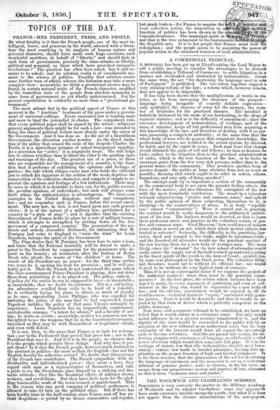A COMMERCIAL TRIBUNAL.
A MEMORIAL has been got up at Lloyd's asking the Lord Mayor kr call a public meeting to consider the advantages to be derived. from establishing a Tribunal of Commerce, to settle litigation in a manner not overloaded and obstructed by technicalities. About the same time, the act " for shortening the language used in acts of Parliament" is published. The two taken together suggest a very striking reform of the law ; a reform which, however remote, does not appear to be impossible.
It has long been shown that the multiplication of words in sta- tutes, so far from increasing the clearness of the purport=- language being incapable of exactly definite expression— only multiplies the chances of error for the unwary, the num- ber of loopholes for the practised sharper. The mischief is infinitely increased by the mode of our lawmaking, in the shape of separate statutes; and so is the difficulty of amendment ; since the excessive development of technicalities, of verbiage, and of the mass of statutes, keeps all but professional men from acquiriug fair knowledge Of the law, and therefore of dealing with it as, per- sons possessing a competent authority ; at the same time that the. whole body of men who do possess that competent knowledge, this professional lawyers, are wedded to the actual system, by interest, by habit, and by the esprit de corps. Each man fears that change would diminish the gams of self and. fellows; he does so because he looks rather to the litigation than to the practical administration of order, which is the true function of the law, or he looks to enormous gains from the few very rich persons, rather than to the general wants of the community. This produces another form of passive despair—the public at large abstains from law as mediae possible, deeming that which ought to. be order in action, odious, hazardous, and sure only of doing mischief !
The attempt made by so. important a section of the community as the commercial body to act upon the, popular feeling attests the force of the motive, and also threatens the corrupters of the kw with the most formidable retribution. The resort to. a volunteer tribunal administering "justice and common sense," and .uphold by the public opinion of those subjecting themselves to it, is - alarming—to the conservatives of abuse. It .is truly " republi- can," almost " communistic " ! Were it carried out in 'practice, the contrast would be really dangerous to the authorized embodi- ment of the law. The lawyers would' be deserted, or fain to learn their profession anew, and practise in' the volunteer courts of ,jue- tice and common sense. Good Heavens ! how madmen of mature years attain so novel an art, which their whole mental, cultural** tended to unlearn ? Seriously, the difficulty to the practising bar- rister, dyed and warped to his trade, might be. insurmountable.; and the deserted old advocates would see the practical conduct of the law leaving them for a new body of younger men. The more likely, since the " demand" for the new school of advocates would easily create the supply out of the half-worked-upmateriatexisting in the finest spirits of the youth in the Inns of Court,—guided; too, by some real philosophers in the black gown. The voluutoer tides: ma, therefore, would not be without its efficient bar; nor would it need to be without the very highest rank of assessors. Tlitis.it is not an extravagant fancy if we suppose the project • the niabiorial realized : what then must be the practical conse- quences ? In the first place, the reform which lawyers have been urged to make, by every argument of patriotism and even of self- interest in the long run, would be superseded by a new body of law ; and the old law, unreformed, would be exposed in all its worthlessness—technical fantastic " equity " contrasted with genu- ine justice. Next it would be deserted ; and thus' it would be =- pealed by that form of decree which is perfectly competent to tho
nonu sage.
Now were such a separate tribunal to be established, we have no- belief that it would endure as a volunteer court. Not only woad& moral influence be in a greater measure transferred to it, and as dignity of the state would be reconciled to the public will by an adoption of the -new tribunal as an authorized court, but the very extremity of the lawyers would force . all except the excessive/1! anile to become reformers. And the act passed last session, for en- dowing stoentes with conciseness of language, would furnish a vita power of reform which would then., come, into full, play. It is in the verbiage of statute law- that idle technicalities flourish most luxu- riantly : concise law tends to broader principles, leaving nice ep- rlicationns the proper function of high and trusted judgment. it is for these reasons, that the phrenomena of the act frir shortening the language of enactment, and the memorial to set up a volunteer tribunal of genuine justice, make us discern, in the far view, ea. escape from our preposterous system and practice of law, alienated as that is from eeommon sense and justice."


























 Previous page
Previous page